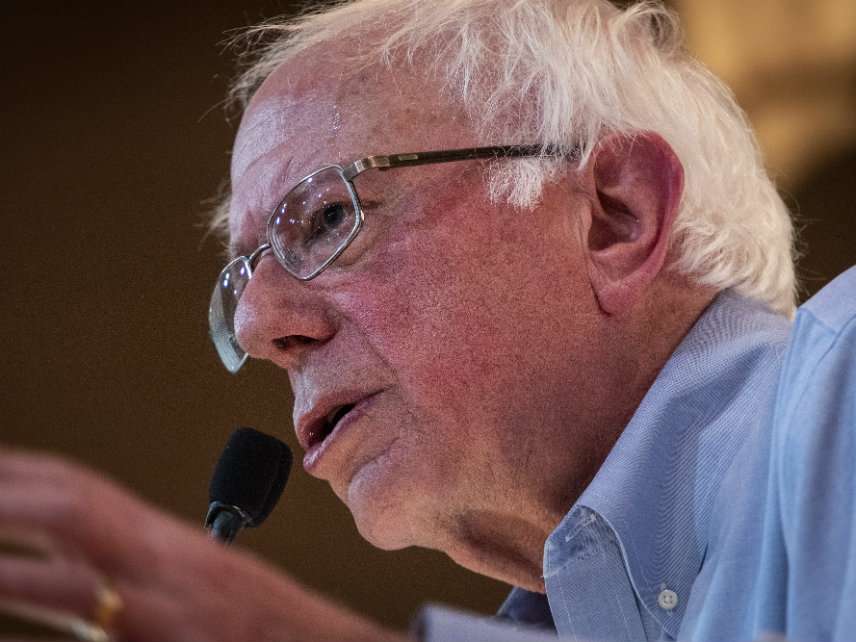Bernie Sanders Targets Walmart With Latest Anti-Corporate Crusade
After taking on Amazon, the democratic socialist has a new target: Walmart.

A little more than two months after sponsoring a bill meant to pressure Amazon to raise wages, Sen. Bernie Sanders (I–Vt.) has a new target: Walmart.
Sanders introduced The Stop Welfare for Any Large Monopoly Amassing Revenue from Taxpayers (WALMART) Act today. The bill's goal is to force Walmart, the world's largest retailer, to pay each of its U.S. employees at least $15 an hour. Rep. Ro Khanna (D–Calif.) released a companion bill in the House.
While the WALMART Act is aimed at Walmart, it would also affect every company with more than 500 workers. Such employers would not be able to buy back their own stock unless they raise the minimum wage to $15, give employees "up to 7 days of paid sick leave to be used to care for themselves or a family member," and prohibit their CEOs from earning "more than 150 times the median pay of all employees," according to the bill's summary.
Walmart, which the summary claims has plans to "buy back $20 billion of its own stock over a two-year period," would likely be in violation of each of those three tenets. The median Walmart worker makes just $19,000 a year, CNN reports, while CEO Doug McMillon earned $22.8 million last fiscal year. Walmart's minimum starting wage, meanwhile, is currently $11 an hour. Finally, while the company did implement a paid sick leave program in February for workers in states with sick leave laws on the books, seven full days is not a company-wide policy.
"The American people understand that there is something totally absurd that you have large profitable corporations who make billions of dollars a year in profit who pay their workers starvations wages," Sanders said, according to The Daily Beast. "While at the same time providing their CEOs with very, very high compensation packages," the democratic socialist senator added, while calling Walmart the "poster child" for "corporate greed" in America.
Walmart says that's not true. "We have increased our starting wages by more than 50 percent in the last three years while also adding new benefits like paid time off, advanced job training, paid family leave and college for $1 a day," the company said in a statement to CNN. "In addition, our associates continue to earn quarterly cash bonuses—more than $625 million last year alone."
Walmart is just Sanders' latest corporate target. As Reason's Zuri Davis noted, the Stop Bad Employers by Zeroing Out Subsidies (BEZOS) Act, which he introduced in September, would require companies with more than 500 employees to fully pay for the government benefits received by any of their workers.
That bill, like the one he introduced today, has virtually no chance of passing, especially in the majority Republican Senate. That's not to say The Stop WALMART Act won't make an impact. In October, Amazon said it was raising its minimum wage to $15 an hour for all U.S. workers. I pointed out at the time that it was unclear whether the move was supposed to silence Amazon's critics (particularly Sanders), or if it was a market-based response to a falling unemployment rate. It's not inconceivable that Walmart, like Amazon, could raise wages in the days to come.
Whether Walmart raises wages, the arguments behind the bill are wrongheaded.
"Preventing investors from buying back shares would essentially trap capital within the very firms that don't need it, which will hurt wages and productivity in the long run," Samuel Hammond, director of poverty and welfare policy at the libertarian-leaning Niskanen Center, told The Washington Post. "This is the latest in the worrying trend of politicians threatening specific companies with ruinous regulations in order to win short term concessions."
Even if the bill doesn't become law (and it probably won't), it's troubling that Sanders is trying to force a private company to pay its workers more. As Reason.tv's John Stossel explains, mandatory higher minimum wages might help existing employees, but they can also prevent would-be workers from getting their foot in the door.
Walmart and Amazon can both raise their respective minimum wages if they so desire. But politicians like Sanders shouldn't be forcing them to do so.


Show Comments (34)